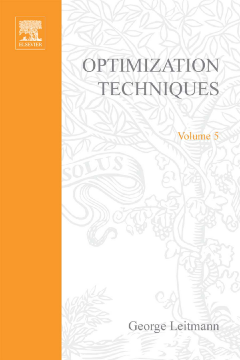
Additional Information
Book Details
Abstract
During the past decade there has been a remarkable growth of interest in problems of systems optimization and of optimal control. And with this interest has come an increasing need for methods useful for rendering systems optimum. Rising to meet this challengc there have sprung up various “schools, often championing onc method and regarding it superior to all others. Long experience has shown that life is not so simple, that the picture is not all white and black. In short, one may expect that a particular method is superior to others for the solution of some problems-rarely for all problems. Furthermore, since the basic mathematical formulation of optimization problems is often essentially the same in many approaches, it is not unreasonable to expect that there may be a great deal of similarity among various methods, a similarity - often, indeed, an identity-which is obscured by dissimilarities in language and notation. To help the uncommitted in his search for and rhoice of the optimum optimization technique is the fundamental aim of this volume.
To accomplish this aim there are assembled in one book ten chapters dealing &h the various methods currently espoused for the solution of problems in systems optimization and optimal control. The choice of authors has been dictated solely by a consideration of an author’s interest and expertiless in a particular method. With the advantages of such an eclectic approach and the ensuing multiple authorship there comes some loss of smoothness of over - all presentation, for which the Editor must take the sole blame. On the one hand, correlation between the various chapters has been achieved by cross-referencing; on the other hand, each chapter can be read as a separate entity setting forth the technique championed by a particular “School.
While each of the ten chapters dealing with methods includes simple examples, primarily for didactic purposes, it has been thought useful to present four additional chapters dealing with applications alone. Of these, the first three, Chapters 11-13, cover specific optimization problems, and the final chapter contains a discussion of problems in the optimization of a complete system, in this case a nuclear propulsion system.
